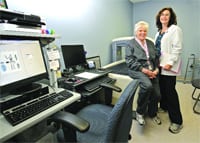Knowing the ABCs of Asthma
A report issued in April by the Asthma Regional Council (ARC) of New England was clear and direct: New England has the highest rates of asthma in the nation, with approximately one in 10 residents suffering from the condition.
The public-health burden of asthma is approaching alarming levels regionally and nationally. The Centers for Disease Control estimates that nearly 24 million people of all ages are afflicted with this chronic respiratory condition. Further, asthma is one of the most common chronic allergic and respiratory conditions impacting children. In Massachusetts alone, nearly 11{06cf2b9696b159f874511d23dbc893eb1ac83014175ed30550cfff22781411e5} of children in kindergarten through grade 8 have asthma, according to the Mass. Department of Public Health.
The reasons why New England has the highest rates of the disease remain a question. Several theories exist, with the region’s housing, climate, seasonal changes, air pollution, and other factors possibly playing roles. In one of its most important findings, the ARC reported that the disease remains poorly controlled in many patients. Almost two-thirds of adults and children reported that they did not feel their asthma was well-controlled.
The signs of asthma can vary between individuals and can present differently in individuals at different times. Milder symptoms can begin as chronic coughing, exercise limitation, wheezing, or shortness of breath. Symptoms can progress intermittently or on a chronic basis to become associated with decreased productivity, work absences, or lost school days. If left untreated, asthma can impair quality of life and lead to disability and even death.
The underlying cause of the condition is inflammation or irritation of the respiratory passages, which constricts the airways, making it difficult to breathe. The causes of the disease may not always be evident.
It appears that genetic factors can lead to a predisposition to become asthmatic. Natural factors (pollen, dust mites, animals, molds, other infections) and man-made environmental factors (tobacco smoke, occupational triggers, chemicals, toxins, pollution) also appear to be playing an increasingly important role. The correlation between passive cigarette smoke exposure and asthma is particularly strong, especially with regard to children. Research has shown that children who live in homes with smokers have a 44{06cf2b9696b159f874511d23dbc893eb1ac83014175ed30550cfff22781411e5} higher chance of developing asthma than those children who do not live in homes with smokers.
One of the major challenges of treating asthma is that each patient has a unique environmental history and a different genetic makeup. For both physician and patient, the first step before any therapeutic intervention is to pursue a thorough review of potential triggers. Once this assessment is made, an asthmatic patient and the physician together can develop a customized action plan with strategies to manage the condition. These steps may include avoidance of offending triggers (removing cigarette smoke, mold, dust, or animals), medications, and, in some cases, desensitization (immunotherapy) to lower the patient’s degree of allergic reactivity.
Since several factors can contribute to poor control, patients who have chronic respiratory symptoms for which the cause may be unclear may want to meet with an asthma specialist for an assessment. This would include a thorough history, physical examination, and some simple tests to verify triggers and assess the severity of the patient’s condition. These findings will provide the basis of a customized action plan that can be revisited over time and adjusted seasonally, as a patient ages, or with changes the home or work environment.
For those patients interested in obtaining a customized action plan to achieve better asthma control, an effective approach would be described simply as this: get tested, get treated, and get better. For more information, visit the American Academy of Asthma, Allergy and Immunology at www.aaaai.org or the Mass. Medical Society at www.physicianfocus.org. –
Dr. Daniel G. Steinberg is a board-certified specialist in allergy/immunology, director of the Allergy & Asthma Center of Massachusetts, and a past president of the Mass. Allergy & Asthma Society.



